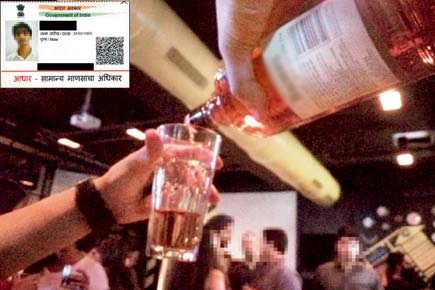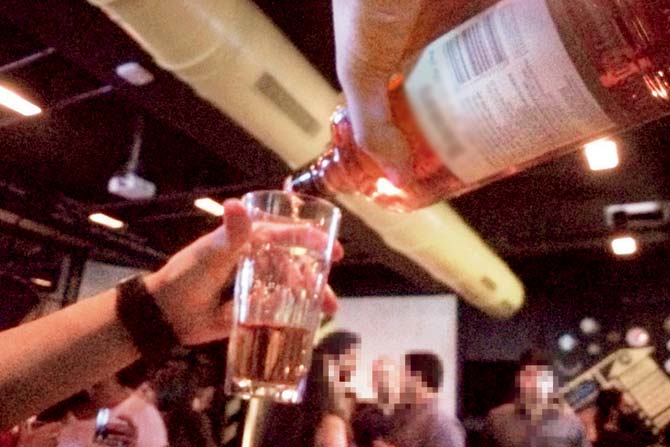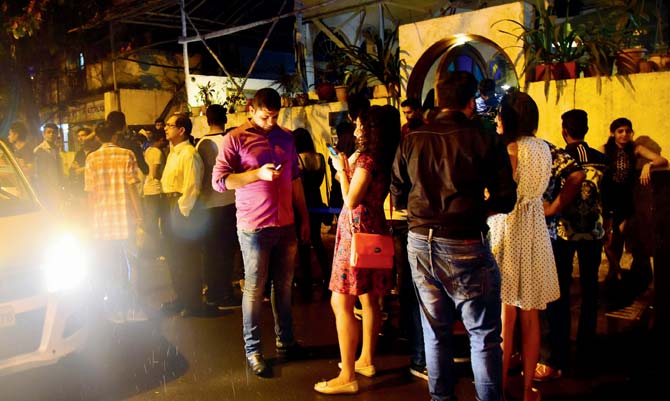Mumbai nightclubs are not allowed to serve teenagers. Yet, it continues to happen. The city's youngsters give mid-day an insight into how they manage to get past bouncers with fake IDs

Mumbai bars: Here's how kids con their way in

A state ruling in 2011 raised the legal age of drinking to 25 in Maharashtra. While beer and wine can be served to 21-year-olds and above, hard liquor can only be served to those above 25. This essentially means that anyone under the age of 21 cannot be allowed to enter the city’s clubs
ADVERTISEMENT
It's 11 PM on Saturday night and a group of 12 climbs the stairs of a popular Lower Parel mall to head to its favourite weekend haunt for a night of heavy partying. There are around 30 youngsters in a queue.
The taller boys with shirts hanging out and young stubble head the pack, accompanied by impeccably dressed girls complete with make-up and stilettos.
“Can I see ID?,” inquires the bouncer at the door. One of the boys pulls an Aadhaar card, establishing that he’s 23 years old. His partner for the night pulls out an ID, too, while the rest of the gang skulks behind. As these two enter, the event manager tells the bouncer to stamp the rest of the crew. A pimple faced boy with spectacles gets held up.
“Can I see some ID please?” He looks inquisitively at his friend and then at the event manager. “It’s all right Danny; let him in,” says the latter. The last of the gang proceed to enter. One pulls out his phone and posts a message on a Whatsapp group “Saturday night plans.” “Heads up—they’re checking IDs at the gate.”
The 12 boys and girls are all teenagers, making their presence inside the city’s nightspots illegal. But, it’s a trend that failed to die out even though the state government raised the legal drinking age to 25 in 2011. If a place is serving only beer and wine, the minimum age of entry is 21 and its rises to 25 if hard liquor is on the menu.
Yet, on weekend nights, long queues of college and school students can be seen forming lines outside clubs like the now-shut Bandra club Royalty or even the much popular Lower Parel hang out Tryst eagerly awaiting a night of loud music and strong dancing.
Finding an in
“The toughest part is getting into the club,” asserts Rahul (name changed to protect identity), an 18-year-old first-year BMM student at a south Mumbai college. With a large social circle, Rahul has organised events at most of the city’s clubs. Events are theme nights — Bollywood, ’90s music — which need a manager, usually a college student, to bring in the crowds. They are expected to send out messages to their friends and call them in and, therefore, turn a blind eye to those below the required age, says Rahul.

Youngsters outside bars in Khar. Pics /Atul Kamble
As a rule, only bouncers at the gate ask for IDs. “Most of us have fake IDs on our phones,” says Rahul, who was born in 1998, but whose fake ID shows his birthdate as 1993.
Prerna, 20, may not be a teenager, but is still not old enough to be at any of the city’s clubs. It barely takes a minute to make a fake ID, she adds. “You do it on Photoshop. Take someone’s original ID and either change the photo or the birth date. I then take a print out and laminate it so that it looks authentic and valid. Bouncers really understand the difference between an original and fake ID. All they look at is your birthdate. Some places like LIV in Colaba and True Tram Trunk in Juhu don’t even bother asking for ID,” she adds.
The manager at True Tramm Trunk, Rohit (who didn’t want to share his second name) says the charge that they rarely check ID cards is wrong. “We always have a manager and/or bouncer at the gate who checks the IDs of people. There is even a board that says entry will be restricted for only those who are 21 and above.”
“ID cards are checked at the gate by the bouncer; only those who are 20 and above are allowed to enter,” says Kiran Maik, manager at LIV, a posh South Mumbai nightclub that sees around 125 people every Friday/Saturday night. “It has to be a government-issued original ID — no soft copies or photocopies are acceptable. This is because there is a lot of manipulation that happens in soft copies.”
But what happens in cases where the person is above 21 and allowed to enter, but orders hard liquor inside? “When they ask for hard liquor, we ID them inside the club itself. Otherwise, beer and wine is allowed.” He also says that a lot of underage party goers — who don’t drink — show up wanting to enter at LIV just to enjoy the music. “Since we serve alcohol and cannot distinguish between who is supposed to be drinking/not drinking inside, we do not allow anyone below 20 to enter.”
Seniors show the way
Prerna, who studies BMM at a south Mumbai college, got her fake ID made when she turned eighteen, something most of those in her group were doing at the time. In most cases, it’s a senior who one day flashes their fake ID and then the juniors learn the tricks of the trade. “We used to do it when we were in high school too. This is a trend that has been passed down from generation to generation and remains the main cheat-code to enter a nightclub. However, in my day, we used to use fake college IDs, and say we were PhD or post-graduate students,” says 26-year-old Anant (name changed), a digital marketing professional.
For those who don’t have fake IDs, confidence is key. “We wear jackets and jeans and walk boldly; the girls wear heels and short dresses. We make an effort to look older,” says Rahul.
No cheap thrills
Rhea often gets mailers or Whatsapp messages about events and offers. Once, on receiving a message about an event at The Khar Hoppipola, she told the organiser her real age and inquired whether she and her friends would be allowed to enter. When given the green signal, she asked why age hadn’t been an issue. “He told me that on weekend nights, a lot of oldies visit the club. They usually order more food and limited alcohol. ‘But you teenagers,’ he said, ‘don’t know when to stop ordering…you’ll give us more business’.”
In some cases, Rhea says, the management inquired before hand as to what their spending limit will be through the night, and accordingly allotted them a table. For instance, if the budget was around R15K for the night, they’d get a small table. “They tell us that those who are underage will not be served alcohol, but once you’re inside, no one checks for ID.”
Jimit Rajput, manager at Hoppipola (which shut for renovation earlier this week), says “We used to accept softcopies earlier but have stopped. In such cases, we ask them for another copy of a government ID. We do not ID people once they are inside. We do allow 19-20 year olds to come in, but that’s only in the daytime, till about 6 pm. Since the last one month, we have been very strict with checking people’s ID cards as it is an order from the management. All bookings go through me.”
Asked about the practice of inquiring how much a person would be spending before allotting them a table, Jimit says: “We take reservations only for three tables, and all three of them are minimum billing tables of R10K-15K each. The rest of the tables can be booked on a walk-in basis.”
Follow the money
With most clubs charging entry — couples for Rs 2,000, stags around Rs 1,500 — a night of partying doesn’t come cheap. A beer costs anywhere between Rs 350-400 and eats starts at Rs 500 per dish.
“I usually carry a debit card when I go out over the weekend, but am not allowed to exceed a certain limit on it, unless it’s an emergency,” says 20 year-old Nikhil, an arts student at a suburban college. Among his favourite haunts are a craft beer outlet at Andheri. He says that his weekly pocket money of Rs 10,000 gets deposited by his parents in his bank account and every weekend, his parents give him another Rs 4,000 for a night out.
Not all parents, however, are explicitly told that the night out involves partying with alcohol. “There are rich kids who have cool parents who allow them to drink; it depends from family to family,” says Rhea. “When I go out, I never say at home that I’m going to a ‘club.’ I say I’m going to a place that has a DJ and a theme night. If we say club, then the parents get apprehensive. Sometimes they even Google the place to see what it’s like.”
 Subscribe today by clicking the link and stay updated with the latest news!" Click here!
Subscribe today by clicking the link and stay updated with the latest news!" Click here!






